Oh, I Just Can’t Wait To Be Queen
Note: The following article contains original research and writing by a Guest Contributor.
Yes, yes, I know. The question of the relationship of children and parents in the Voltron series was raised and discussed more than once. In children’s series, this is generally a favorite topic. But in this meta I’d like to talk not about what a good parent should be, but about the symbolism that these relations endow in our favorite show. Moreover, I’d like to discuss the storyline of Allura, because it was she who collected all the paths of the classic female protagonist. This symbolism in one form or another is repeated in most fairy tales, where a young girl is the main character, and if different peoples agree on the same stories, then the message of these stories deserves attention.
And I’ll start from the old legend of King Arthur. More precisely, from the legend of Sir Gawain and Lady Ragnell. In this legend, King Arthur, in order to save his life, must find the answer to the question: what do women desire for? And Lady Ragnell, in exchange for marriage with Sir Gawain, tells Arthur the correct answer: women desire for power over men, even the greatest of them. Sir Gawain himself, having married an ugly old woman, finds a beautiful wife, but only after he allows her to decide her own destiny.
Why am I telling you this? Because the whole universe in the Voltron series was somehow under female authority, where great men became a bargaining chip or prize in the hands of their women. This trend was set by GoLion and DOTU, where the Space Goddess was considered the main deity, and poor Allura had to constantly quarrel with her nanny, who believed that the princess should stay at home, get married and then give birth to children, and even closed Allura in her room when the enemy attacked the castle. Unfortunately, this story arc wasn’t developed properly in DOTU, and Allura’s happy ending was reduced to the fact that she didn’t have a marriage of convenience, but ended being together with a brilliant Keith.
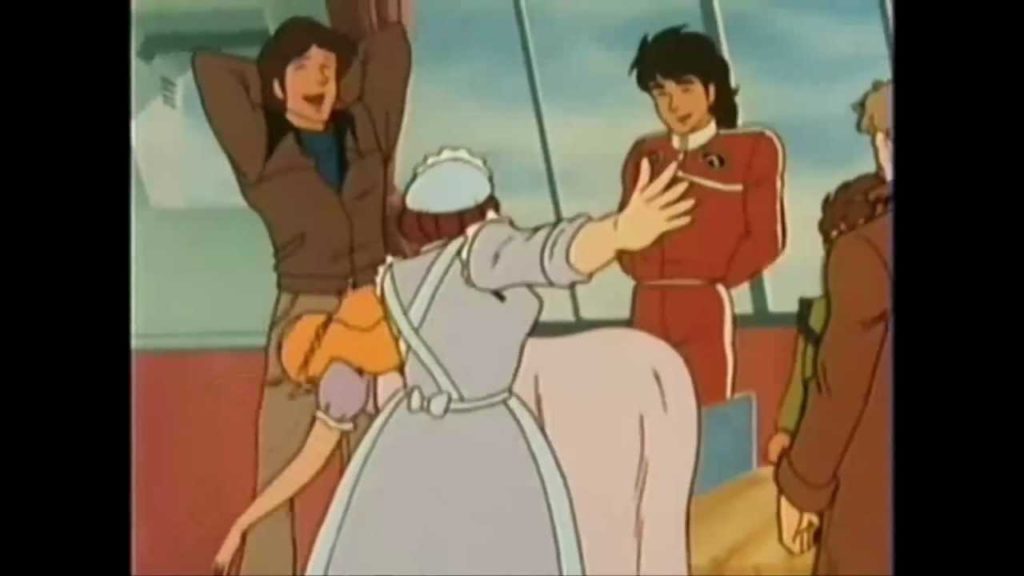
In VLD, everything has taken on an even wider scope. We’ve got not only the Lion Goddess, the plot began to revolve around female power. There were few female rulers in the series, but for the most part they had a significant influence on the plot and life of the main characters. And these are not just abstract female rulers, I’ll call them the general term – the Queen Mother. This is an empowered woman who directs all her influence to protect her children: both people whose lives depend on her decisions, and her ideas, laws and orders that she promotes.
The first of the queens who clearly demonstrated her royal and maternal power was the leader of Olkarion. The Olkari had a significant influence on the plot, and Queen Mother Ryner helped Pidge to accept herself as the Green Paladin and said one of the main phrases of the series: We’re all made up of the same cosmic dust.
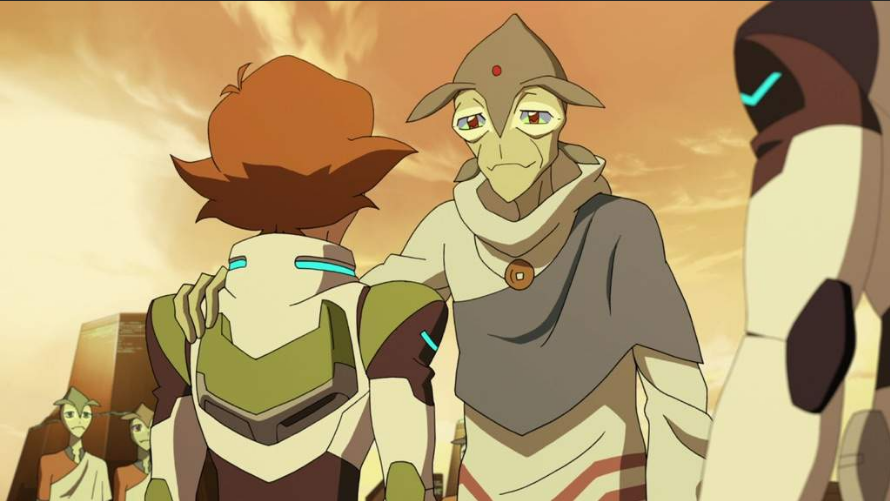
The second of the queens, the most inconspicuous one, became Melenor. She, alas, is already dead at the beginning of the events and doesn’t commit any obvious significant acts in the series. They rarely talk about Melenor, but her behavior in flashbacks suggests that it was she who was Altea’s heir ruler, not Alfor at all as it might have seemed initially. This is easy to understand by the fact that a) Alfor doesn’t wear a royal crown, b) Melenor appears at all diplomatic meetings, c) at Zarkon’s table, Melenor is closer to the host of the castle, from the point of view of etiquette this means that her status is higher than Alfor’s. Naturally, the question arises: why did I remember all this if she didn’t decide the fate of the peoples on the screen? The answer lies in the storyline of Allura, which we’ll analyze later.
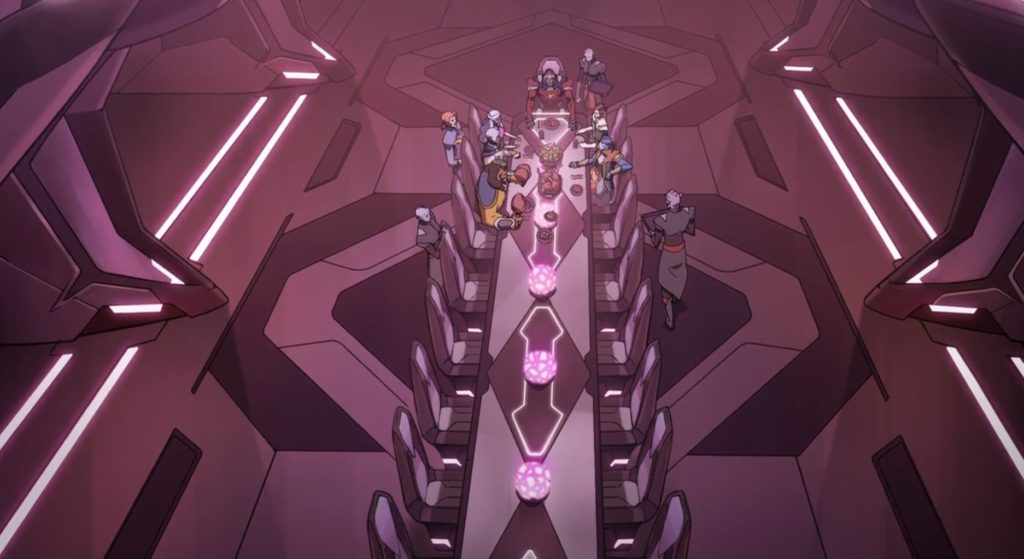
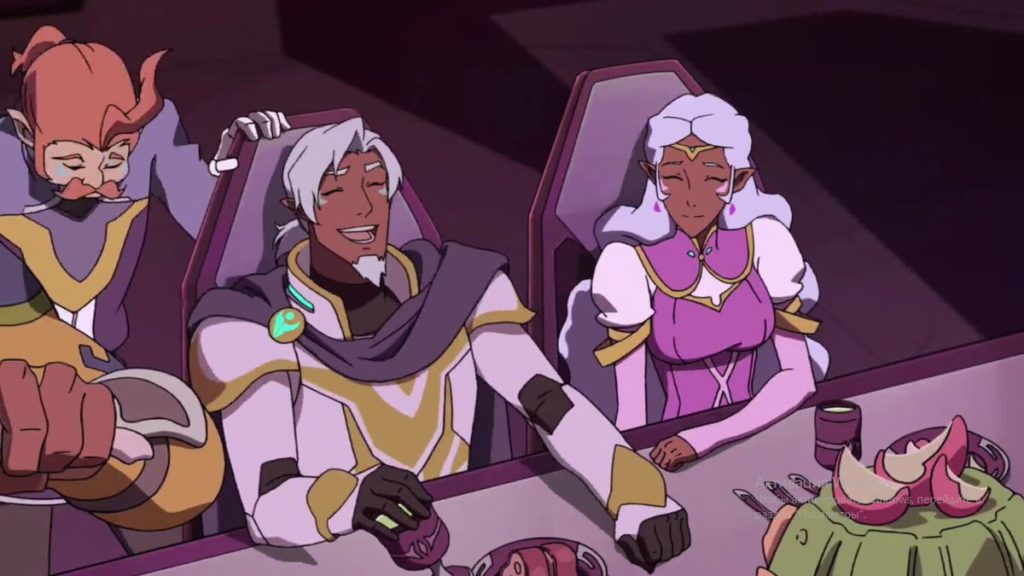
The third Queen Mother became Sanda, defender of Earth – the home planet of the paladins. If you read my meta about her, then you know that many problems in S7 happened simply because Samuel Holt refused to recognize her authority and instead of dialogue went to an open confrontation (because he defended the positions of his Queen women). And as a result, we got a completely logical development of events: when you undermine the power of a mother, you automatically put her children in jeopardy. Unfortunately, there was no King near Sanda who could support her influence. And although the children were able to survive this conflict, the mother herself dies, and Holt, as a winner, puts his protege in the place of the queen – and I mean Shiro.
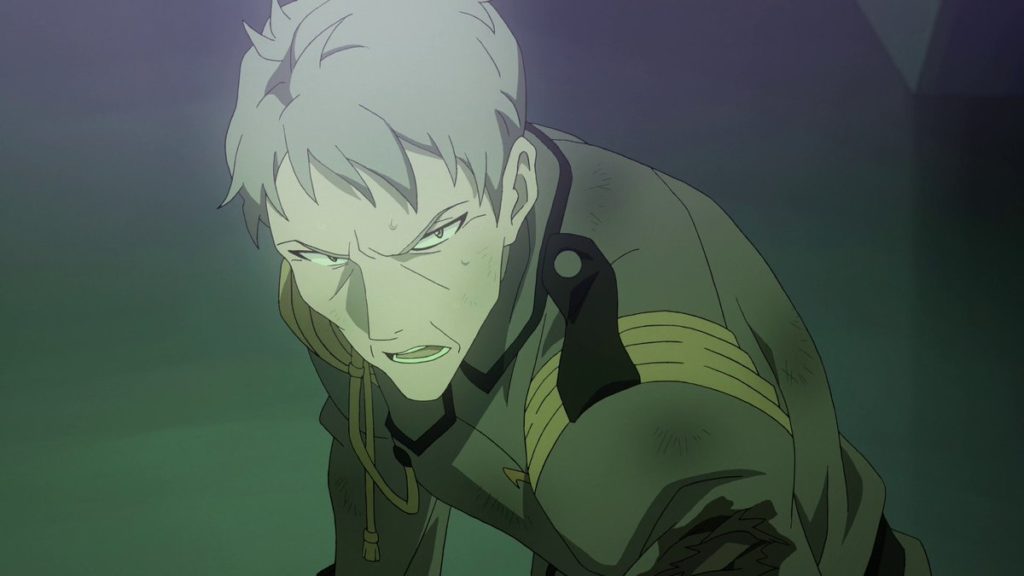
No, Shiro isn’t a hidden woman. He is certainly a man, a courageous and noble one. But symbolically, in S8 he really became the Queen Mother. Firstly, in his quest to avenge Adam, Shiro became the personification of Allura from S1. It is through Shiro that Allura was confronted with the past and saw his post-traumatic thirst for revenge in a new light. Secondly, in his storyline Shiro is shown as a metaphorical mother who protects her children without sparing herself, and therefore needs someone who would protect her.
And I must say that the fact that he’s gay is very organically superimposed on all this, completing the coding of Shiro as the Queen Mother, because it implies the possible appearance of the King next to him. In S8, our new Queen Mother had to come to a balance, but this balance is by no means a matter of resigning and becoming a housewife. To protect her children, the Queen shouldn’t give up power; on the contrary, she must affirm it. In the case of Shiro, it means to get over his trauma and learn to trust his pain to loved ones.
We meet the fourth Queen Mother in Lotor’s memories. Ven’tar met a young prince who had just left his home and opened up a new unknown world and path to maturity. With her help, young Lotor tried for the first time to establish himself as the King, and the subsequent death of Ven’tar and her planet became a turning point in his life.
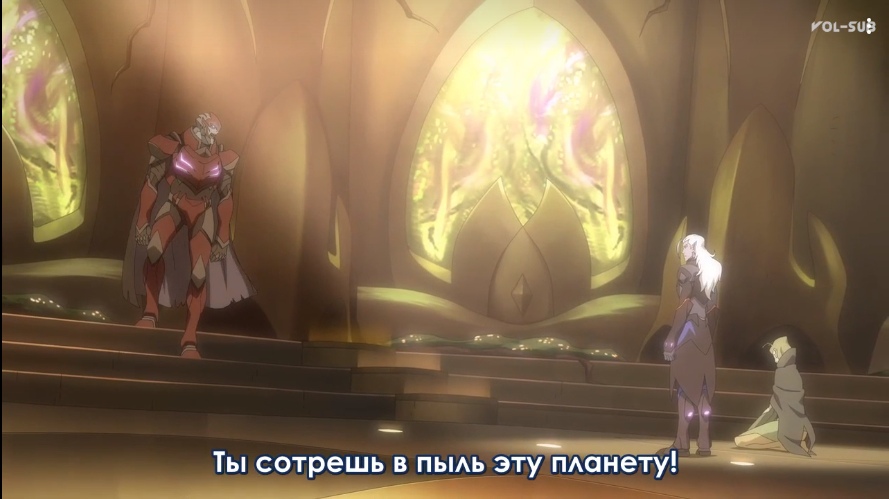

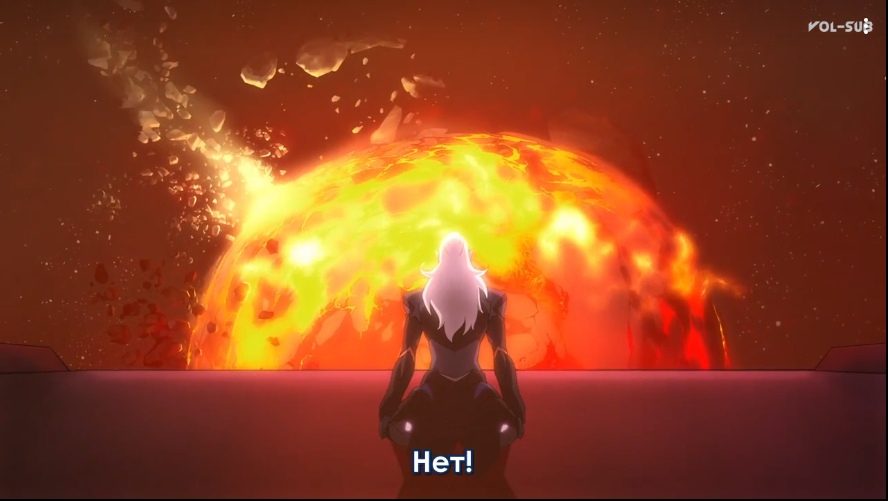
And you need to understand that the title of King in the series isn’t just the title of ruler. The symbolic King embodies the power that allows the Queen to assert her authority (remember Hades and his command to mortals to build temples in honor of Persephone, while he did well without being worshiped). And I can’t fail to notice that Lotor constantly surrounded himself with women and, as far as possible, endowed them with influence. He left his colony in the care of Merla, and his subordinates became generals only thanks to his patronage. The prince felt the need to fulfill his destiny – to become the King, and therefore he was looking for his Queen. But, alas, the last ten thousand years Lotor was under the rule of his literal Queen Mother, who absolutely didn’t want to give up positions and give her place to someone else. Constant supervision on her part didn’t allow him to somehow prove himself in this field – as a result, during relations with Alura he demonstrated the behavior of a workaholic who put an end to his personal life.
And yes, I’m talking about Haggar/Honerva. The last and the most important Queen Mother of the series. She established her authority through Zarkon, the first symbolic King, who did everything to extend the influence of his wife to every corner of the universe. Of course, the series shows that Honerva knew her place and didn’t argue with her husband when he made some decisions, but we know very well how women twirl their men. And Knights of Light. Part II episode (S8Ep10) directly showed us that the soul of Zarkon was under the rule of his wife. Zarkon became the embodiment of her boundless power, and Honerva did her best to maintain this order of affairs.
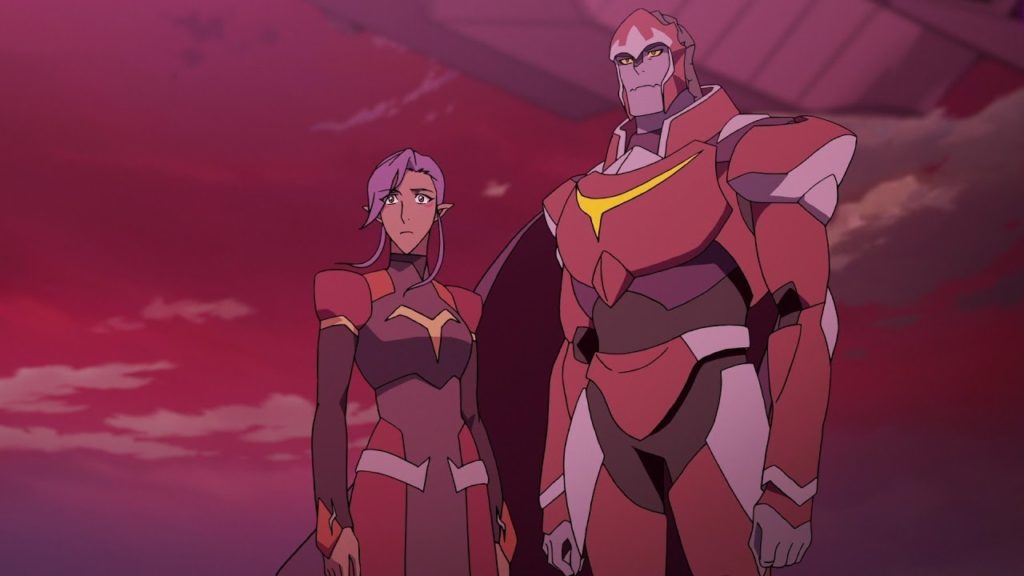

It was she, not Zarkon at all, who tightly controlled her son, preventing him from bringing the new Queen to the house. She defended her influence and throughout the series chased the paladins like a she-wolf chases a bunch of hares – many times they were saved from her literally by a miracle. And in S8 she personally demonstrated that all the Galran armies fade against the backdrop of the Queen Mother, who ruled the whole universe for ten thousand years.
However, our whole life is cyclical. The Queen rules and gives birth to her children, personifying the era, then she dies, and in her place comes the new Queen, embodying a new round of the birth of life. But Honerva refused to give way to a new generation, she sought to consolidate her authority both through her husband and through her son, despite the fact that the latter actively resisted this. Her era had long since begun to rot and stink badly, but instead of letting it die, Honerva continued to support life in this agonizing body.
And the mission of Allura, as a princess, was to force a change of era if the old Queen doesn’t want to do this voluntarily. For a long time, Honerva couldn’t give birth to at least some life, her last child – the last cry of the universe wanting to survive – was Lotor. Life under the rule of the infertile Queen is fading, and in the case of Honerva it faded in the literal sense of the word.
But if it was the mother who stood on the path of Lotor to the throne, on Allura’s one it was her father.
I’d like to say a few words in defense of Zarkon. Even after losing his mind, Zarkon took care of his son and entrusted him into the hands of a motherly figure. Dayak, as an imperious and strong woman, adequately performed the duties of the Queen Mother and raised the King that the universe needed.
With Alfor things are very different.
While the ingenious husband flew through space and was looking for adventure, Melenor was engaged in the education of her daughter as best as she could. By her twenties, Allura knew about diplomacy, etiquette, governance, and even martial arts. But at the same time, despite her full potential, she showed zero knowledge in alchemy, although her father was considered a recognized genius in this field. Throughout the series, before visiting Oriande, Allura used her abilities intuitively, and in the first encounter she defeated Haggar not at the expense of knowledge, but at the expense of pure power and the support of the Blades.
That is, Alfor simply didn’t engage in the education of his daughter in this area. In his eyes – the eyes of a man who was constantly absent at home – his daughter always remained a little girl. And little princesses should stay in a safe castle, not protrude into a cruel, dangerous life. So, instead of studying alchemy in the same place where Alfor and Honerva studied, Allura was home-schooled by her mother.
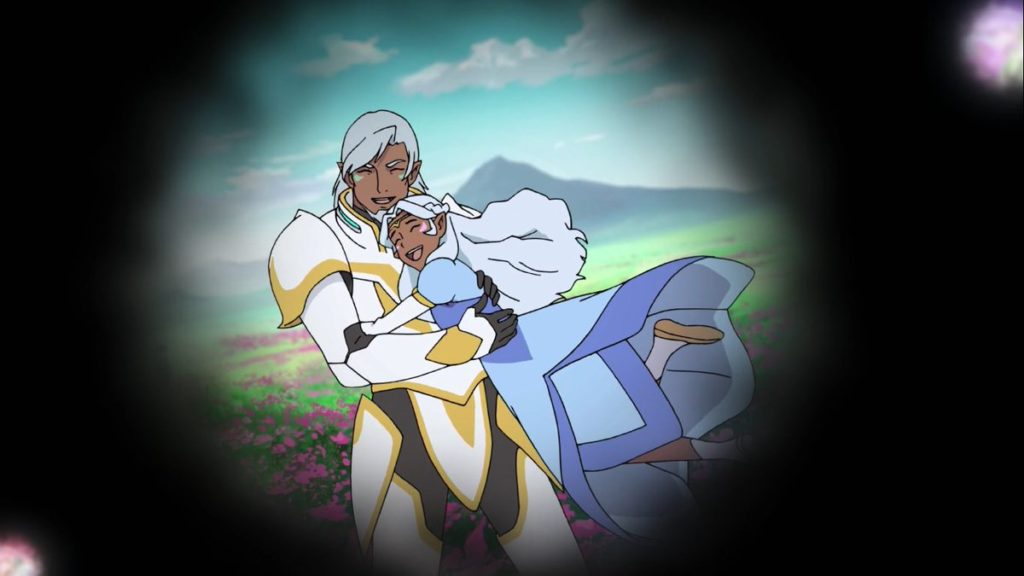
From the point of view of symbolism, this served as further evidence that Alfor wasn’t the hereditary king. True Kings – Lotor, Zarkon, and even Samuel Holt – were engaged in strengthening the influence of their women, while Alfor, on the contrary, asserted his authority through them. And besides him in the series we meet only one person with similar behavior. Lance, a nee farmer who wanted to rise to at least the rank of simple knight at the expense of Allura. But if Alfor earned his status as a brilliant alchemist, then Lance had no exceptional advantages, and in the end, unable to bear the burden of the King, he simply broke down and went into oblivion.
And Alfor himself didn’t do his job too well. With Altean alchemy and Voltron in his hands, he managed to lose the war to Zarkon. «I’m a scientist, not a leader» isn’t the best characteristic when your opponent fully possesses leadership qualities and fighting talent.
But, one way or another, he had an influence on his daughter, and this influence served her wickedly. Allura was born in order to become the Queen, this was her destiny – but it seems that Alfor thought differently and did his best to leave her in the position of a child. And from this point of view, I even feel sorry for Allura from the alternative reality where Honerva wanted to escape. Because there she never got rid of her father’s power.
In the main reality Alfor dies, but before that he demonstrates his power as a father for the last time and refuses Allura the right to defend Altea – her potential children. Allura wakes up ten thousand years later only to find out that her kingdom and metaphorical children have perished. They fell at the hands of another – more successful – King.
What happened was a shock for Allura: she hadn’t yet become the Queen, but was already left without a kingdom. Moreover, Allura perfectly understood that in this particular case the cause of the fall was the insufficient fulfillment of male duties – the duties of the King. That her father, despite all his genius, didn’t do it properly. And that in order to rectify the situation a King is needed, capable of opposing Zarkon and talking to him man to man, so to speak.
But Allura was a princess, she never ascended the throne, and she didn’t have a King. But she always admired her father, she sought to be like him – and naturally, in a fit of revenge, Allura decided to take the King’s duties upon herself. But each of the crowned spouses has their own important responsibilities, and one person physically can’t fully sit on two thrones at once. And since after the death of Altea Allura came to the conclusion that the duties of the King were more important, she simply pushed her responsibilities as a princess into a dusty corner.
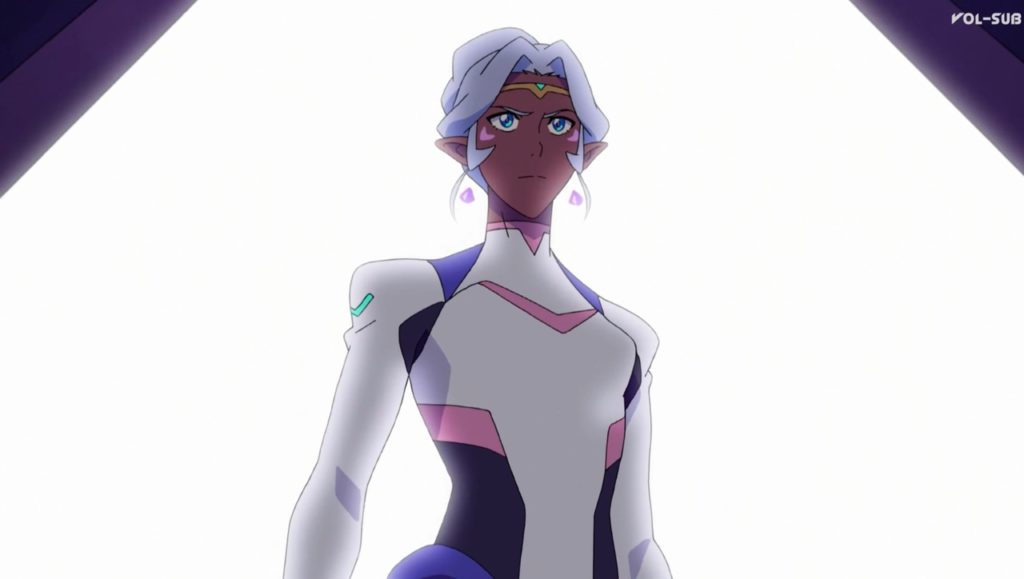
And… this status wasn’t very pleasant.
Allura didn’t immediately accept that the inhabitants of her small kingdom (paladins) refused to obey her rules, and even honestly admitted that she lacked the old way of life. In the position of the King, Allura felt quite insecure and uncomfortable, since the ability to command armies wasn’t taken from the air. Of course, she showed daddy’s desire to make instant decisions, but later she began to reflect on the correctness of her actions. And when Kolivan appeared and offered a plan, Allura, despite all her post-traumatic xenophobia, accepted it because she was subconsciously looking for someone to throw these responsibilities on. She also tried to move Shiro to this position, and until S5 Shiro really looked like a potential King.
Note: in fact, the King’s manners then greatly interfered with Shiro as the Queen. Sitting on two chairs never led to anything good.
But, despite Allura’s apparent difficulties in this role, society was in no hurry to alleviate her fate. The paladins didn’t want to see the Queen next to them – the hostess of the house, setting the rules; they wanted to see the King – the first among equals with whom they could both go to war and drink at a feast, and Shiro, being a mentally traumatized man, didn’t hold on to his position of leader too tightly. And we also had Coran, who constantly kept repeating: «Father would be proud of you, princess», prompting Allura to actively follow the decision to catch up and overtake Alfor. Nobody remembered Queen Melenor, and this can even be understood – after all, the war is on, and it takes place on the territory of the enemy.
But you simply can’t run away from your destiny; and the moment X came when Lotor appeared in the Castle of Lions. Lotor, when meeting with a potential Queen, demonstrated his readiness to establish a dialogue. Once in the territory of the Castle, he behaved as an obedient guest, in no way trying to undermine the authority of the King – the late Alfor – and encroach on the power of Allura as the ruler of this small kingdom. He was the first, after a lot of time, who expresseed his readiness to obey the laws and rules that Allura could establish, and defiantly ignored the paladins with their «democracy». Lotor didn’t know that Allura had decided to change duties, he saw the Queen in her and communicated with her as it should be communicated with the Queen.
And Allura liked it.
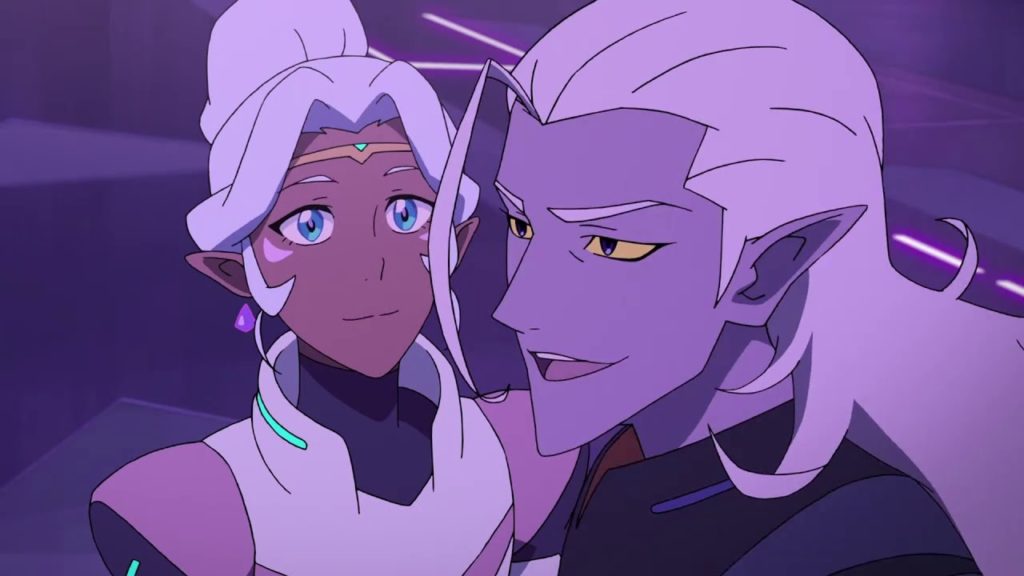
But she was stuck in her position between two thrones. If she was the Queen in the territory of her kingdom, she could call everyone to submission. But she was in the house of her parents – the dead King and Queen – and her power as a princess wasn’t supported in any way. On the other hand, Allura still held the status of the King, in which she felt very insecure and subconsciously trying to throw these responsibilities on someone else.
As a result, Allura had to submit to the opinion of the paladins, who considered Allura the King, and Lotor – a rival, representing a danger to her power. She liked how Lotor behaved, she liked his offers, but she simply wasn’t mentally able to follow her line, because she felt that she didn’t have enough influence and power for this.
And this insecurity could cost Lotor’s life if Honerva hadn’t intervened. Having remembered that she had a son, Honerva didn’t want the death of her only child, because each Queen Mother seeks to protect her children. Yes, she didn’t want to lose her King, but the King can be replaced unlike her child. Therefore, she used Kuron and gave him the order to support Lotor by any means, and we can see how «Shiro» sharply and aggressively began to carry out this support, which didn’t fit with his behavior earlier.
In parallel, Honerva was rapidly looking for a new King, and found him in Sendak. But now she’s not going to give him at least some freedom, because she knew that at the first opportunity Sendak would try to remove Lotor as a potential rival. Her plans included returning her son to her control, either as a child in submission, or as the King Son near her throne.
Unfortunately, Lotor knew Shiro too poorly to notice such changes and to treat his support with suspicion. He was afraid of surveillance and sabotage by his mother, but didn’t even suspect that the paladins weren’t observant at all. In addition, after the death of Zarkon, who defended Honerva’s power, Lotor felt relaxed. He planned to crush the kingdom of his father and thereby deprive his mother of the opportunity to rule, and thanks to Kuron he was able to implement at least the first part of this plan.

The second part of the plan was a bit more complicated, because you can’t just take and remove the Queen from the throne. The Queen will leave, and her duties will remain. It was necessary to find a replacement for her, and in the eyes of Lotor Allura was perfectly suited for this role. A literal marriage or romantic relationship wasn’t required in this metaphorical alliance, the main thing was the willingness to accept the title and responsibilities. And having become the King, Lotor began to strengthen both his position and the position of Allura as a potential Queen. Allura possessed the great gift of an alchemist, but didn’t know how to use it wisely, and Lotor solved this problem, practically giving her all the knowledge of Oriande on a platter. Of course, he would like to get this knowledge himself, because he, as the King, had a plenty of work to do, but he was completely satisfied that Allura was equal to Honerva and became a worthy rival for her.
Allura reacted very favorably to such behavior. Lotor performed a feat in her honor: he defeated Zarkon – her main offender and aggressor, whom neither the paladins nor Allura as the King were able to defeat. And after that he completely proved his worth by asserting himself as the new ruler of the empire. In her life, a man finally appeared, ready to take away her «male» duties, and she felt relief without even realizing it. She finally could not only return to the duties of the princess – close, understandable and comfortable for her – but she began to look very differently at the former enemy territory. Lotor made it clear that she could behave like a hostess in his house, and when Sendak threatened the inhabitants of the empire, Allura immediately expressed her willingness to defend her potential children.

And everything would be great, if not for a big but. The paladins and Coran still saw Allura as the King, and Lotor – as her potential rival. The fact that the two Kings united to defeat the third one doesn’t mean that they’ll be allies forever. The empire is one for two. The paladins didn’t trust Lotor and waited for him to betray them. And Allura, who hadn’t yet become the Queen and hadn’t relieved herself of the King’s duties, was in a very precarious position. She officially remained the Princess of the Castle – the kingdom of her father. The princess has influence, but only as much as her parents measured, and for the rest she is in the same subordinate position as the other children. And since the King-Father deceased ten thousand years ago, the influence of Allura as a princess completely went to zero.
Therefore, when Keith brought Romelle and gave the paladins a reason to say «Yeah, we knew that», we got a stalemate. Because Lotor already saw Allura as his Queen, and the Queen usually tries to defend the King as a guarantor of her power. And if Allura acted as a Queen, confident in her rule, then she would doubt the accusations and demand proof from Romelle.
But… Allura still remained a princess/daddy’s daughter – a girl who depended on someone else’s opinion and didn’t have her own. And when the paladins in righteous rage demanded from Allura to act as a King… she took their word for it and attacked Lotor as a rival who certainly didn’t expect such behavior from his Queen.
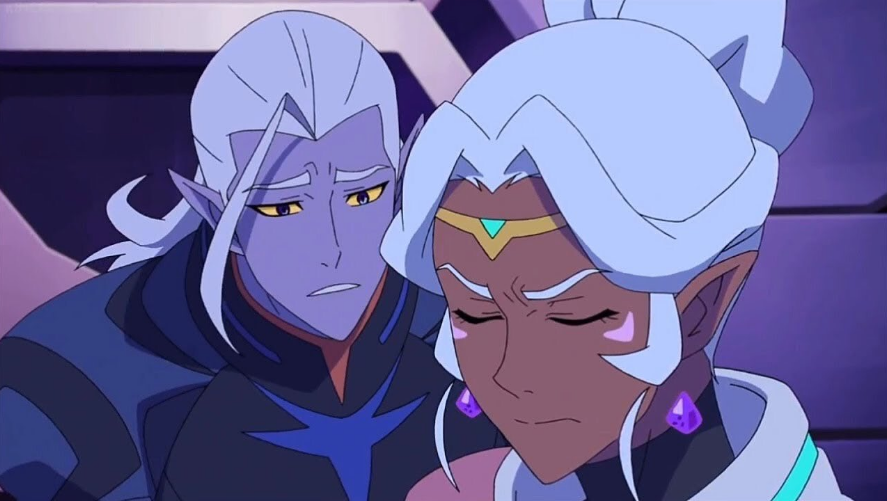
Lotor found himself in a very vulnerable position, because the symbolic King can’t raise his hand to the Queen of his kingdom. Neither the former nor the current. That’s why he was so powerless towards his mother and Allura. Yes, the King may try to somehow stop the violent woman, but it’s difficult to do this when she attacks you with a knife.
At that moment, Allura didn’t understand what she was doing. The paladins convinced her that she was betrayed by the rival King, like Zarkon had once betrayed Alfor, and with all the fury of the offended woman she rushed to take revenge.
She rushed to take revenge only in order to later realize with horror what she had done.
The King had just stood before her and offered to finally put on the crown and become the Queen, and she killed him. Which led to terrifying consequences both for her personally and for the whole kingdom, because at that moment it was Lotor who was the main defender of both the empire and the power of Allura herself.
You know, there’s a saying: the destiny leads the one who wants and dragrs the one who doesn’t. And in response to the reluctance to become a Queen, the fate dragged Allura along gully and stones. Allura was frightened, she didn’t want to leave her father’s house to enter a new independent life, and in response this cozy, safe castleship was taken away from her.
Then Allura still had a chance to rectify the situation – to force the paladins to save Lotor from the Rift. Yes, she lost the old castle, but she would have a new one. But Allura couldn’t protect her King, she was afraid, and as a result she was thrown out into the street. And this is the worst thing that can happen to the Queen.
Because the Queen doesn’t run with swords and flags through foreign territory, she rules her kingdom. And the King is engaged in the expansion and strengthening of the borders of this kingdom. That’s why Sanda categorically refused Samuel’s demand to fly somewhere into space and fight with someone, because she knew the boundaries of her influence and wasn’t going to go beyond them. Samuel demanded that the Queen should become the King, and Sanda couldn’t just take and throw out her duties in the window. The very same «You are not the leader that Earth needs» – with a hint that the planet was desperately lacking the King, whom Samuel himself turned out to be.
And having remained without a castle in a foreign territory, Allura lost not only the last crumbs of her influence, but even the safety that the walls of her home provided to her. She was in the territory of another Queen, and couldn’t even establish herself as a King – because there were quite enough Kings in these lands. She even ceased to be a princess, since Shiro – the new Queen – didn’t see her as his heiress.
Note: remember that when Allura arrived on Earth, it was Shiro who introduced her, and he did that simply by name without any titles.

Naturally, in such a situation, she felt miserable and frustrated. Yesterday, the crown was right in front of her eyes, and now she’s turned into a subordinate child under the leadership of another ruler, who took the last inhabitants of her kingdom. And instead of the King, who’s able to conquer a new kingdom for her, they offerred one of the knights to her and expected that she would see him as an equal.
From the Queen’s point of view, it’s the bottom.
And here – S8 – Allura began to remember her mother. More precisely, the Queen Mother Melenor. Because it’s the Queen Mother who promotes and defends the interests of the young princess, she prepares her for entry into adulthood. And if Alfor was completely satisfied that Allura remained in the position of a little girl, then Melenor did everything possible to promote the growth of Allura, because she saw a heiress in her. And in this crisis situation, Allura really lacked her support and advice on questions asked not by little girls, but by young women entering adulthood.
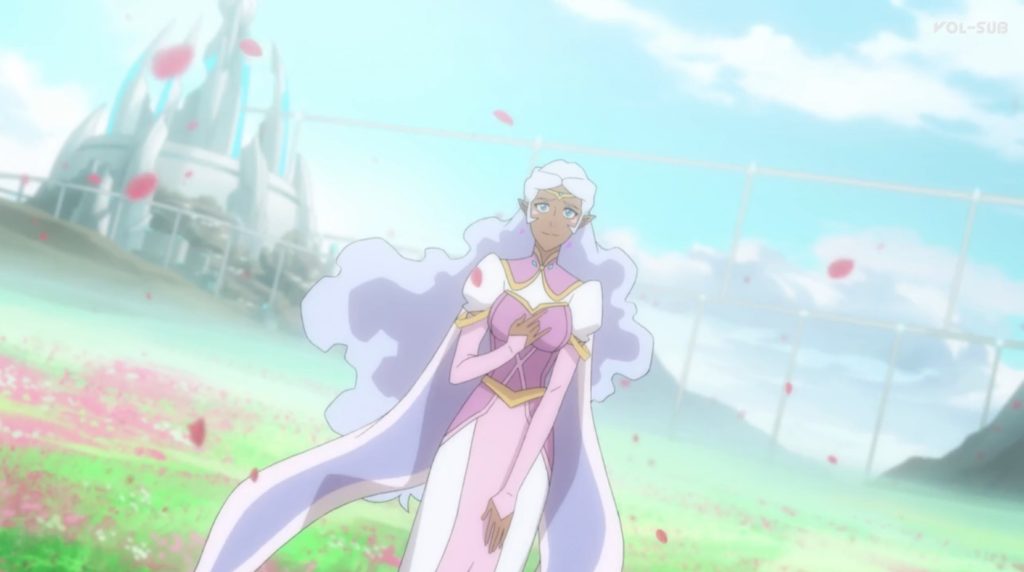
She no longer wanted to be King, but didn’t know how to regain her kingdom. When she had a chance to show her power to the Queen and protect Shiro from the aggression of her rival Honerva *, she decisively got rid of a crown – a symbol of her privileged childhood status, although it was very bitter and painful to lose that last thing that remained.
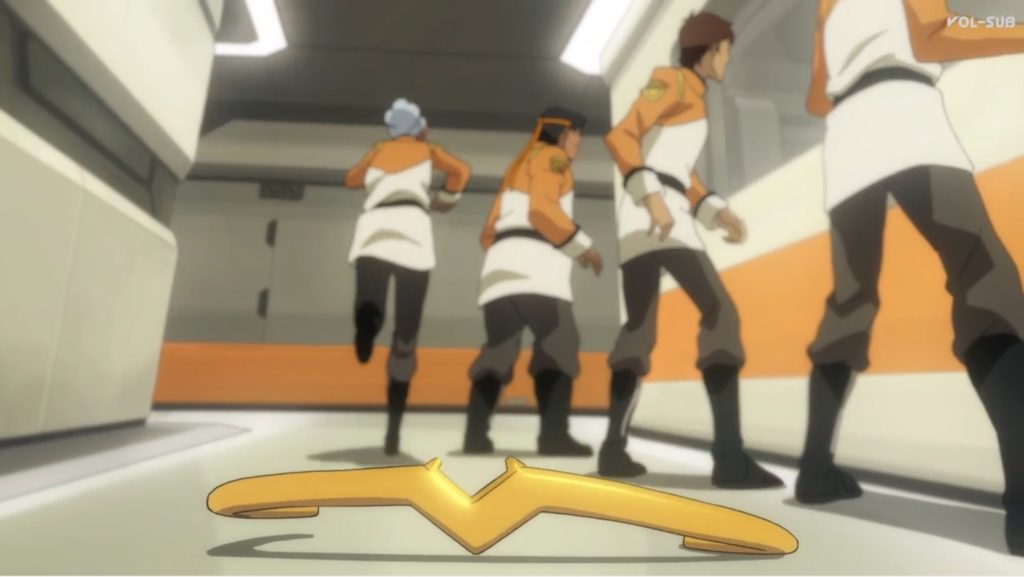
And in these conditions, Honerva needs to be given her due – not wanting it, she was the one who managed to pull Allura out of the quagmire. Allura was her successor, and Honerva, as a rival Queen and Queen Mother, was simultaneously the motivating factor that helped Allura to rise again.
While Lotor could influence the situation, he warned more than once or twice that Honerva was the most dangerous creature in the universe, but the paladins had a short memory. But she remembered them well and longed for bloody revenge. Having lost her only son, Honerva became furious. Without children, the Queen Mother’s rule becomes meaningless, and all that Honerva wanted was to destroy this wasteland and start anew, but she herself had long been infertile. And so she made the decision – to somehow change this situation, even if for the sake of this she had to destroy the universe. And she used all her power of the Queen Mother and her King, Sendak, to achieve this.
And it turned out that Shiro couldn’t oppose anything to the Queen Mother of this level. He destroyed Sendak, but Honevra towered over the Coalition like an impregnable rock. And Allura, with her abilities as an alchemist, was no longer taken seriously by anyone.
And like last time, the tipping point comes with the return of Lotor to the battlefield. Honerva fell into despair: she was unable to return to that world where she could have children, and she decided to take the last step – to go to another reality, where her existence still makes sense. To get into this reality, everything else needs to collapse, and she’s ready to make this sacrifice, because as mentioned above, the Queen doesn’t need a kingdom without children. Destruction of the paladins fades into the background, now her main goal was to get Sincline to cross the space between realities. She achieved her goal and realized with amazement that the lost son was alive. His appearance strengthened Honerva’s power among the Alteans, and if she succeeded in putting him on the role of the King-Son, then in theory, he could restore her influence over the entire universe.
True, Lotor could be against this state of affairs. In their last meeting, when Honerva directly proposed to recognize her power as Queen Mother, Lotor categorically refused. It’s very difficult to call a creature, capable of only killing, your mother. A lever of pressure was required, and preferably a carrot, not a stick – in the end, the Queen’s responsibilities are not to pacify rebellious children.
Note: we can see on the example of Empress Allura what happens when she starts doing this herself. Just an amazing mix of striving to pacify children with a desire to take care of them.
And the only metaphorical carrot that Honerva could offer Lotor was to return the favor of his Queen, because Lotor had been looking for his Queen for years. But in one kingdom there can’t be two equal Queens, and the potential of Allura allowed her to become a dangerous rival. And Honevra tried to seduce her, offering to return that familiar cozy world – the position of the princess – to keep her close, but under control. But Allura was tired of being a child, and she didn’t want to be a child in the kingdom of the infertile Queen.
Honerva had a short conversation with rivals: without wasting time, she gave her son, as her new King, an order to get rid of this obstacle. But remember – the King can’t raise his hand to his Queen. And even in this state – being in a blind rage and merged with Sincline – Lotor couldn’t and didn’t want to do this, just like he couldn’t and didn’t want to accept Honerva as his Queen Mother. Therefore, she had to surrender in order to hide her son’s disobedience, re-evaluate the situation and try to calm her child.
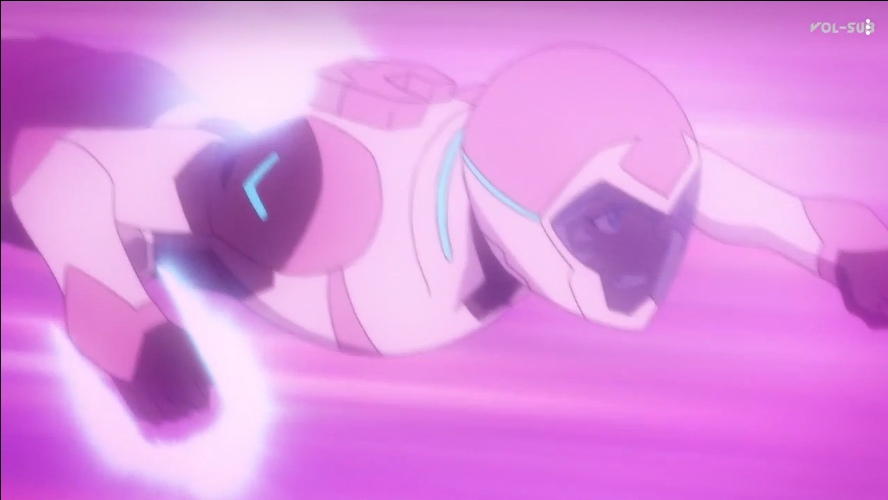
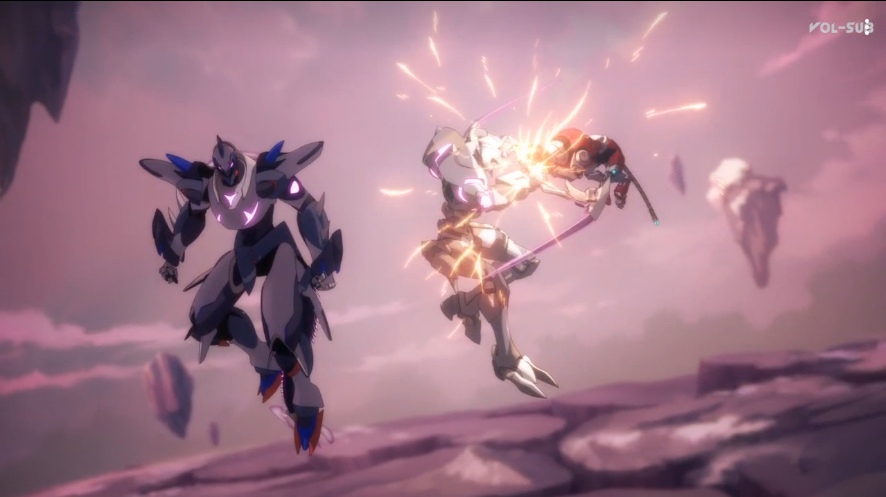
Allura was left in complete confusion and deep frustration. Honerva not only won the fight, but also took her King, who smashed to smithereens the great and invincible Voltron. It was a challenge, but the princess had no idea how to answer it. She still felt like a Queen without a kingdom, especially now when she saw that her King was in the power of another one.
«Now that Honerva has Lotor, no one can stop her» – a sad and laconic description of the situation, because with the support of the Altean colony, Lotor could really establish a new hegemony of Honerva in the universe. He could if he wanted to. But he was sick and tired of being under the control of his mother, and even after becoming a part of Sincline, Lotor found a way to resist.
And he came to Allura – as a shadow, an echo of himself, because he knew that only Allura could fight with Honerva on an equal footing. He spoke to her, and Allura, not noticing it herself, complained to him of her powerlessness. At that moment, the desire to trust him was much stronger than all the offences and accusations offered by Romelle and the paladins. Seeing that there’s no aggression in the uninvited guest, Allura turned to him as the last ghost of her royal power. And Lotor helped her, because she’s his Queen, and even in this state he’s ready to raise the banner in her honor.
We can talk for a long time about their conversation in a dream, but this isn’t necessary for our meta. At the moment, we’re not even interested in the conversation itself, but in the scene that preceded it. The scene where Allura takes power into her own hands and protects her children – her Altea. Where her mother says she’s proud of her and is ready to pay with her life for her daughter to begin a new era. Which, incidentally, is directly opposed to what Alfor did in the real world.
Queen Melenor waited ten thousand years for her daughter to grow up and put on her crown. And finally this moment has come.

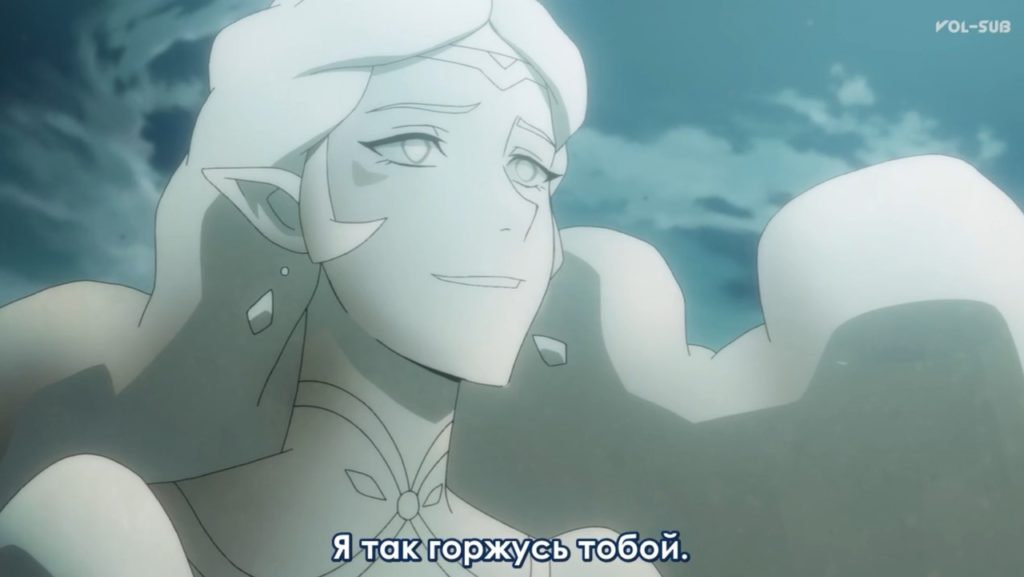
Allura returned to reality inspired and full of strength. The invisible support of the King returned her foundation to her feet, now she knew how to answer the challenge. The princess finally stepped to her throne to become Queen, and it wast for nothing that the ghost of Zarkon confused her with Melenor.
The situation was overshadowed by only one thing: her King was still in the grip of a rival, who was in no hurry to admit her defeat. Lotor, as emperor of the Galra and ruler of the Alteans, became a new embodiment of power over the entire universe, and only those who possessed this attribute of power could call themselves the new Queen/mistress of the whole world.
And so the brave prince the brave princess must mount her faithful horse lion and save the beautiful princess the charming prince from the scary dragon witch. Very feminist, I think.
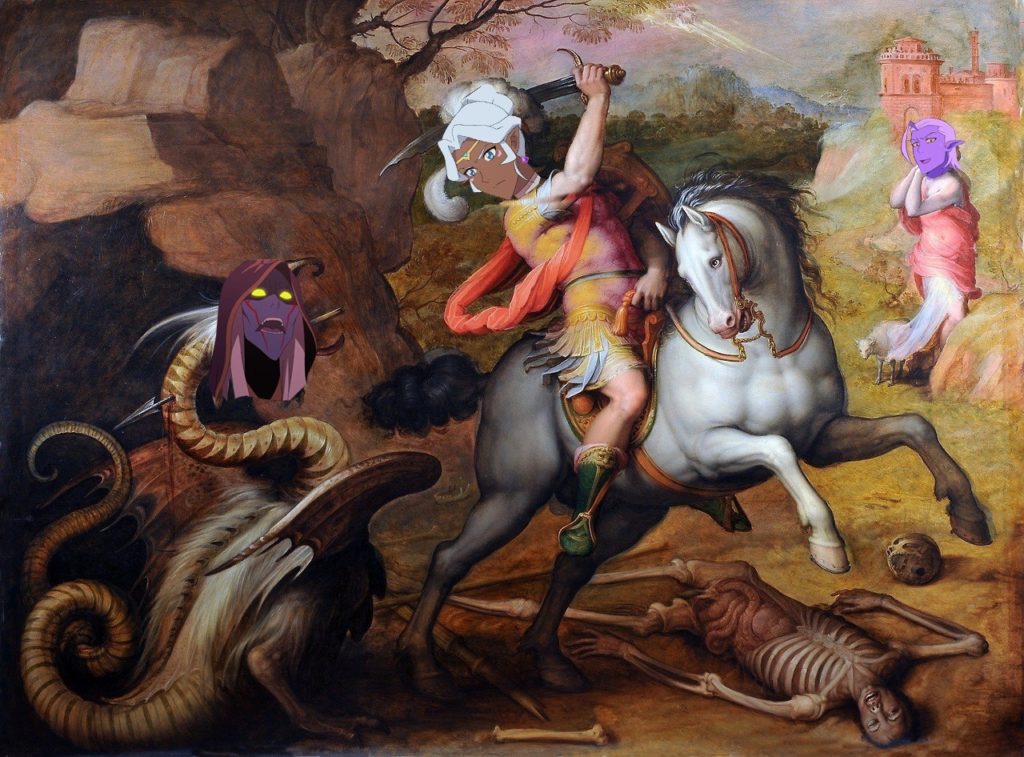
Although in reality there is nothing more traditional than the war of women for influence over men, because «women desire for power over men, even the greatest of them».
And taking into account the fact that Lotor also had his opinion on this subject, the victory should ultimately remain with Allura. She takes her King and ascends the throne to begin a new era, as it should be in the right story. The old Queen leaves, the young Queen takes power, and a new era of life and prosperity begins in the universe.
But what we’re shown in S8… breaks the whole symbolic concept, although there are individuals who’re confident that everything is fine. This confidence is associated with a completely incorrect interpretation of the symbolism of the female protagonist, which they’re trying to promote to the masses. And in two hundred a couple of words I’ll try to explain what’s wrong here.
Firstly, why Allura shouldn’t have died? To find the answer to this question, you need to understand that in the subcortex of our consciousness there are certain associations that allow storytellers without words – just in images – to explain what’s happening. In particular: a woman subconsciously sees herself as the giver of life (therefore, female villains look especially dangerous and scary because of the reversed symbolism), and the child, accordingly, is a symbol of this life. As a result, when a young girl enters the scene, she’s both a symbol of the continuation of life and a symbol of life itself, and you simply can’t mentally perceive her death as something good. The death of a young girl has always been a tragedy. You can be persuaded how much they can say that «The good guys won, this is a happy ending», but you will perceive such statements as lies. The death of a woman is seen as something right only when she’s a mature woman who sacrifices her life to save a child. From the latest shows, we recall She-Ra, where Shadow Weaver absolutely consciously and voluntarily saves Catra at the cost of her life. Mother saved her child so that she could live on. Sadly – yes, tragically – no. Because «It’s too late for me, but you… this is only the beginning for you». Death collects its harvest, but the mother’s life continues in her children.
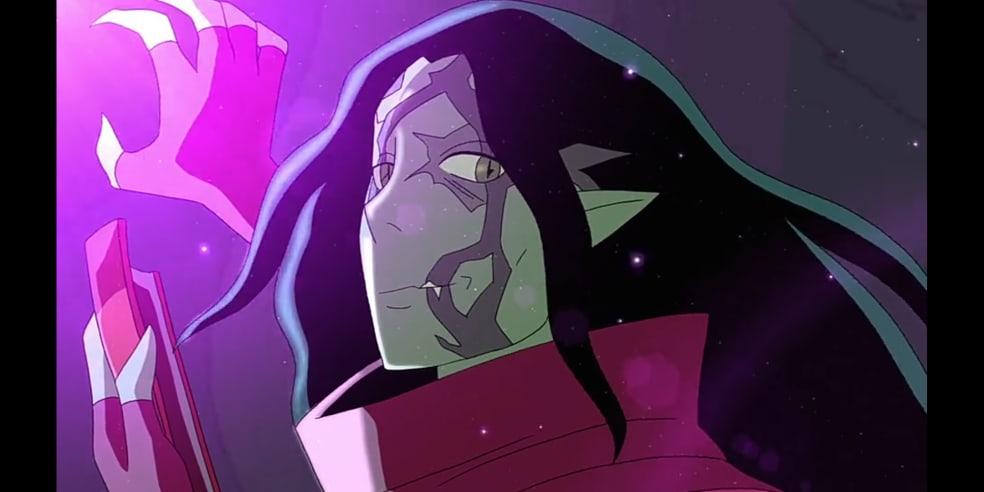
And the life of Allura… just cut short. Alfor sacrificed a whole planet to save his daughter, but as a result, fate decided that this was wrong, and exchanged everything back. Happy ending. But for whom?
Secondly, the situation with the rescue of the charming prince. There’s an opinion divorced from reality that the salvation of «bad boys» is the last century. You know, the chicken isn’t a bird, a strong woman isn’t a person and she doesn’t have the needs from the Maslow pyramid.
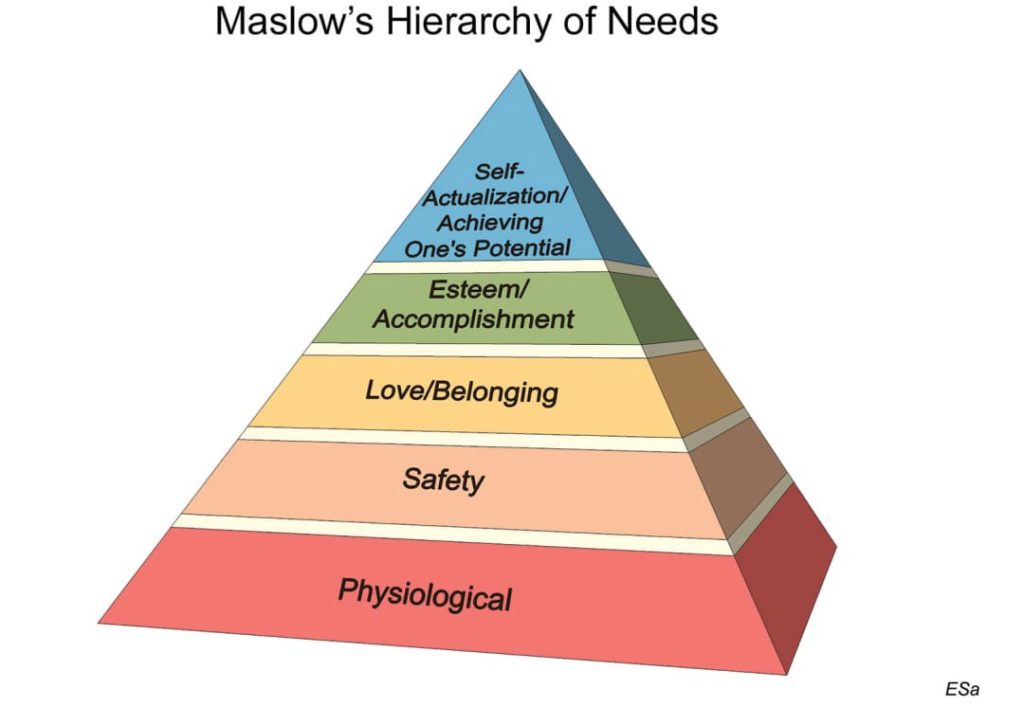
So, ladies and gentlemen. Some of you clearly don’t understand the symbolism of the «bad boy» storyline. A fairy tale isn’t only a story about adventures, but also an allusion to real life. And the salvation of the «bad boy» has a very important message. Important both five hundred years ago and now.
The origins of this are based on the fact that the victory over dragons was never part of the ordinary life of a young girl. In ordinary life, this is either an emergency, which a normal society is trying to prevent, or a woman’s conscious choice – a prepared, balanced decision to become a dragon slayer. But with the choice of a boy, the situation is different. In ancient times, the choice of a man was the main choice in the life of a girl, because he determined her whole future life. The level of influence and freedom of a woman depended on a man, and choosing the right man was very important. This is especially important because in the matter of choosing a spouse, so-called good-natured people very often got in the way of a young girl – those who, naturally with good intentions, wanted to influence this decision, because they were sure that they knew better what she needed.
And I’ll tell you that such an opponent is worse than any dragon. Because… they’re kind of a friend, not an enemy, you can’t poke a spear at them, or what else people do with the overgrowth lizards. And unlike a dragon, such an enemy can be found everywhere in the life of every girl. If romance isn’t your cup of tea, then replace the word partner with the word profession, and you’ll see that everything is the same here.
«Bad boy» is a personal choice of a young woman that she must defend. And yes, this is precisely the male person, since the man for society was at the same time not only a potential husband, but also the main danger – the main aggressor, from whom they sought to protect the woman.
Of course, these stories have their flaws – often too blindly they convey the main character’s faith in the virtues of a bad boy, which can’t be called a good lesson for young people. And the story of Allura in this regard is much more mature and better: Allura not only had to save her prince, but she also learned to think critically – to understand that trusting a person is a very expensive gift.
And it’s very sad that in the show we received Allura – I can’t say otherwise – screwed up.
She:
- believed the word of the first comer, and we’re served this as the right thing. Trust to your friends is wonderful, but trust doesn’t endow friends with omniscience and wisdom; they can also be mistaken;
- was afraid to defend her opinion in terms of saving her prince, she bent under those very good-natured people;
- when later these good-natured people began to incline her to a relationship with a «good» boy, she obeyed, although at first she answered «no».
Alfor would probably be pleased.
This is why, the way the storyline of Allura was finished in S8 is absolutely wrong. Yes, she has many shortcomings, and part of the fandom openly hates her for them, but don’t let this hostility blind you. No matter how the character infuriates you, try to understand: in reality there are no ideal people. And it’s unlikely that in ordinary life you wish death to all the people who annoy you. You want these people to change and become aware of their shortcomings rather than die, and I don’t understand why Allura should be denied this. She, like all young people, walks through life, making mistakes, and there’s nothing good in the fact that some of these mistakes destroyed her. So let her grow up and become wiser. In the end, a lot of her negative qualities can be found in us, and you wouldn’t wish such a fate for yourself. Right?
____________________________________________________________________
*If you recall that all the scenes with Honerva were cut from S7, it’s easy to assume what happened to Shiro at that moment.

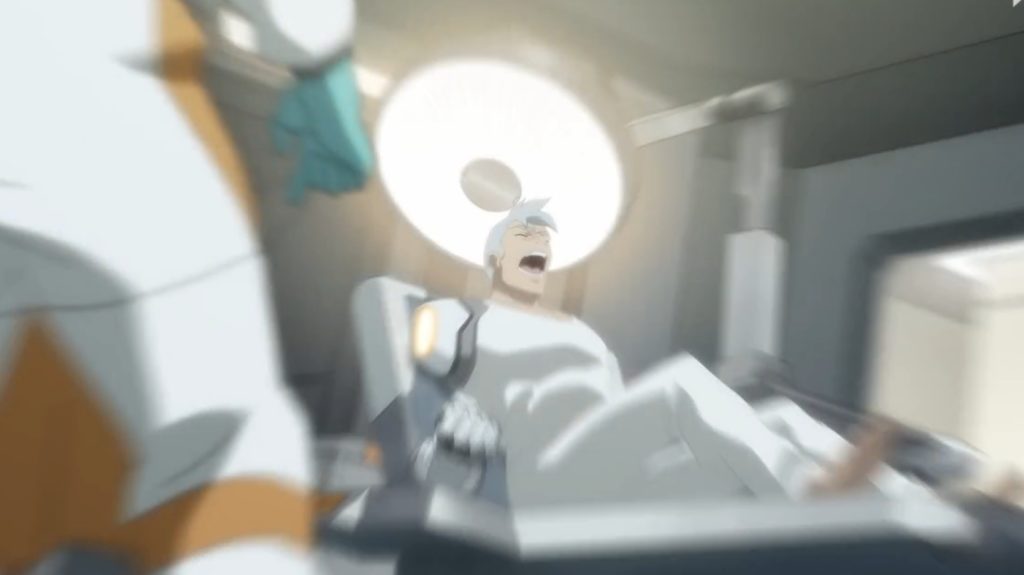

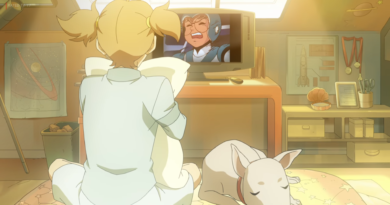
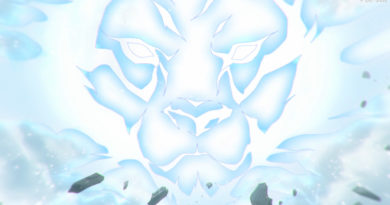
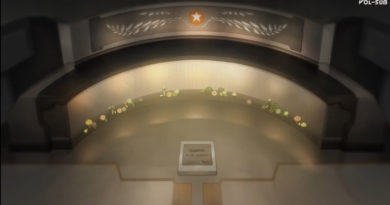
what happened to shiro…
Kuron and Shiro were merged, and Kuron’s soul was under the control of Honerva until the very end – she even forced him to pass the last trial of Oriande instead of her. I have no idea of what exactly happened then, but there are two options: either she tried to call him to submission (unlikely), or to kill him (the most likely). All this is a reaction to the fact that Allura decided to replace his hand – that last remnant of influence on Shiro that Honerva had.
This was a brilliant meta to read, so enjoyable and I love how well you explained how the plot is literally centered on Queens, on a female narrative, in the show!
Reading this BLEW MY MIND
I could finally put a finger on/understand the feelings I got that I felt were so wrong with the show when I was watching it.
Thanks!
Brilliant exposition…I couldn’t have explained it better myself, even if I’d tried! Thank you for posting this!